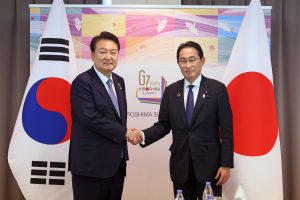On the sidelines of the Hiroshima G-7 Summit on May 21, Japanese Prime Minister Kishida Fumio and South Korean President Yoon Suk-yeol congratulated one other on making remarkable progress in bilateral relations in the face of growing global challenges. The Kishida-Yoon summit meeting in Hiroshima was their third in two months, signaling a thaw in ties that have been marred by unresolved historical disputes.
But Japan’s plans to discharge 1 million tonnes of treated nuclear wastewater from the crippled Fukushima Nuclear Power Plant into the Pacific Ocean has been driving a wedge between the two countries. In South Korea, there are fears the contaminated water could harm public health and the marine ecosystem, which could damage the reputation of its seafood. In January, public distrust in the Japanese decision to release the water boiled over into South Korean protests.
The release of Fukushima wastewater has become a highly politicized issue. Japan insists the water is safe to drink. It has been treated through the Advanced Liquid Processing System (ALPS), which removes 62 radioactive materials but is unable to remove tritium (a radioactive isotope of hydrogen). TEPCO says the ALPS treated water will be diluted with seawater to reduce tritium to less than 1,500 becquerels per liter. They say that is well below the World Health Organization’s regulatory standards and poses no risk to the international community.
Japan hoped to make a case for the wastewater’s safety by allowing a delegation of 20 South Korean experts to conduct inspections on the treatment process. The decision was a sign of broadening cooperation and coordination between Japan and South Korea. Meanwhile, the South Korean government, which is keen to push forward on bilateral ties, hoped to allay the public’s fears through an inspection.
During last week’s six-day visit, the South Korean team inspected various Fukushima nuclear power plant facilities and ALPS equipment. They will continue to analyze and review treatment and discharge plans from South Korea. The team has requested additional documents around purification procedures in the case of a power outage. They said more analysis is needed before they can come to a conclusion on the safety of the water.
There has been some criticism over the effectiveness of such an inspection given that the International Atomic Energy Agency (IAEA) is expected to release its own findings on the treated water next month. Experts say that ocean currents put Russia, Canada, and the United States at most risk of any harmful effects of the Fukushima wastewater; however, South Korea is the only member of IAEA that is carrying out its own inspection.
The issue of lingering radiation from the Fukushima nuclear disaster has become tied up in the broader problem of mutual mistrust between Japan and South Korea. Two years after the nuclear meltdown in 2011, South Korea banned seafood imports from Fukushima, arguing the information given by the plant operator TEPCO was “scientifically inaccurate.” South Korean authorities say they will not consider lifting the ban even if the treated water is determined to be safe.
The current pivot toward improving Japan-South Korea relations sits on a shaky foundation. In Japan, opinion polls show that there are deep rooted doubts as to whether Yoon, who has a low public approval rating in South Korea, can keep up the momentum. Meanwhile, in a survey conducted by South Korean public opinion research firm Gallup Korea, 49 percent of respondents said that “there were no results from the bilateral talks.”
More than 1,000 tanks of treated water are stored on the nuclear plant premises, but space is expected to run out early next year. The release of the wastewater will take decades, which could either facilitate increased mutual cooperation or continue to stifle diplomatic ties between the two countries.
































